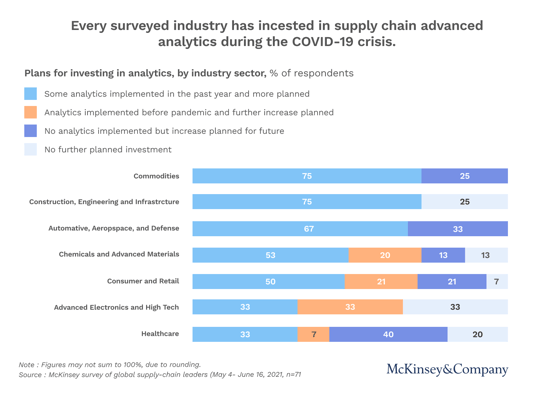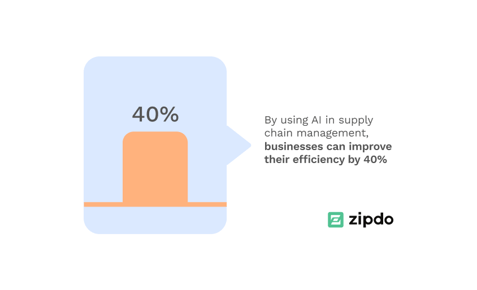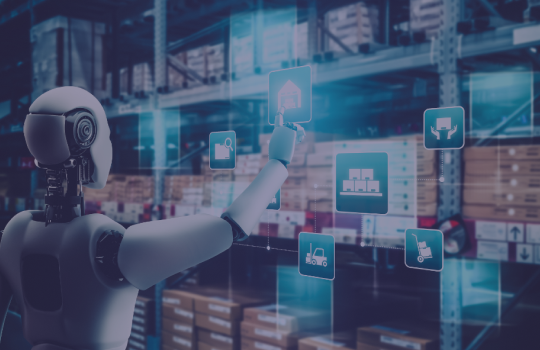The Impact of AI on Supply Chain Efficiency and Resilience
The Impact of AI on Supply Chain Efficiency and Resilience
Imagine a world where supply chains never falter, even in the face of unexpected challenges. This is not a distant dream but a rapidly approaching reality, thanks to the power of Artificial Intelligence (AI).
In today's fast-paced business environment, supply chain efficiency and resilience are more than just buzzwords; they are the pillars of successful supply chain management. AI is transforming these pillars into formidable strengths for businesses around the globe.
In this article, we explore how AI is revolutionizing supply chain efficiency and resilience, offering insights that are not just thought-provoking, but also actionable for businesses aiming to stay ahead in the game.
Quick Takeaways
- Efficiency involves moving goods cost-effectively and timely, while resilience is about quickly adapting to disruptions.
- AI improves supply chain management efficiency by 40% through data processing, trend prediction, and task automation.
- AI in supply chains leads to a 50% reduction in forecasting errors and a 65% decrease in lost sales, enhancing resilience.
- Successfully integrating AI into supply chains involves understanding existing infrastructure, managing data quality, selecting the right tools, training staff, and continuous adaptation.
Understanding Supply Chain Efficiency and Resilience
Efficiency in supply chains refers to the ability to move goods in the most cost-effective and timely manner, minimizing waste and maximizing value. Resilience, meanwhile, is the capacity of a supply chain to quickly adapt and recover from various disruptions, whether they stem from natural disasters, economic shifts, or unforeseen events.
A significant statistic that highlights the importance of supply chain resilience is that 75% of companies on the supply chain are changing practices based on lessons learned from the pandemic. This statistic underscores the critical impact that disruptions, such as the COVID-19 pandemic, can have on supply chains and the global economy.

In today's interconnected world, a resilient supply chain is not just a strategic advantage, but a necessity. Companies are increasingly recognizing that while striving for efficiency, they must also invest in building resilience to withstand and quickly recover from disruptions. This balance is essential for maintaining a competitive edge and ensuring long-term sustainability in a rapidly evolving global market.
The Role of AI in Enhancing Supply Chain Efficiency
AI’s ability to process vast amounts of data, predict trends, and automate complex tasks is transforming the supply chain landscape. AI's role in this transformation is multifaceted, impacting various aspects of supply chain management, from inventory control to logistics and demand forecasting.
A recent study shows that businesses can improve their efficiency by 40% through the use of AI in supply chain management. This significant improvement is a testament to the power of AI in:
- Optimizing operations
- Reducing costs
- Enhancing overall performance

Optimizing Inventory Management
Enhancing Logistics and Transportation
Improving Supply Chain Resilience
AI’s Impact on Supply Chain Resilience
A recent study shows that businesses using AI in their supply chain operations have observed up to a 50% reduction in forecasting errors and a 65% decrease in lost sales. This dramatic improvement in accuracy and efficiency is crucial for maintaining a resilient supply chain, especially in volatile market conditions. 
Enhanced Risk Management and Predictive Analytics
Real-Time Decision Making and Adaptability
Automated Problem-Solving and Efficiency
Long-Term Strategic Planning
Integrating AI into Existing Supply Chain Systems
Key aspects of integrating AI into existing supply chain systems include:
- Understanding the Existing Infrastructure: Assessing current processes, technologies, and data management systems to identify where AI can be most effectively applied.
- Data Quality and Management: Ensuring the accuracy, completeness, and timeliness of data, which is crucial for the effectiveness of AI applications.
- Choosing the Right AI Tools: Selecting AI tools and solutions that align with specific needs of the supply chain, considering factors like scalability and ease of integration.
- Training and Change Management: Adapting to the changes in workflow and training staff to work with new AI tools, which is essential for a smooth transition.
- Continuous Monitoring and Adaptation: Regularly monitoring AI systems post-integration and making necessary adjustments based on feedback and evolving requirements.
- Collaborating with AI Vendors and Experts: Working with AI vendors and experts for customized solutions and ongoing support.
The integration of AI into supply chains is a complex but essential process for modernizing and enhancing supply chain operations. As AI becomes more prevalent in the industry, its integration will be key to maintaining competitive and efficient supply chains.
Embracing the Future: AI's Transformative Role in Supply Chain Management
Hypersonix is leading the way in transforming the retail landscape with its cutting-edge solutions that integrate AI/ML, IoT, blockchain, and AR technologies. By fully utilizing unified data, Hypersonix empowers CPG companies to tap into new growth avenues and foster innovation, preparing them for the dynamic future of the market. Read about Hypersonix's ProfitGPT
Experience the transformative power of Hypersonix's AI-driven solutions for your pricing strategies by booking a demo now!






